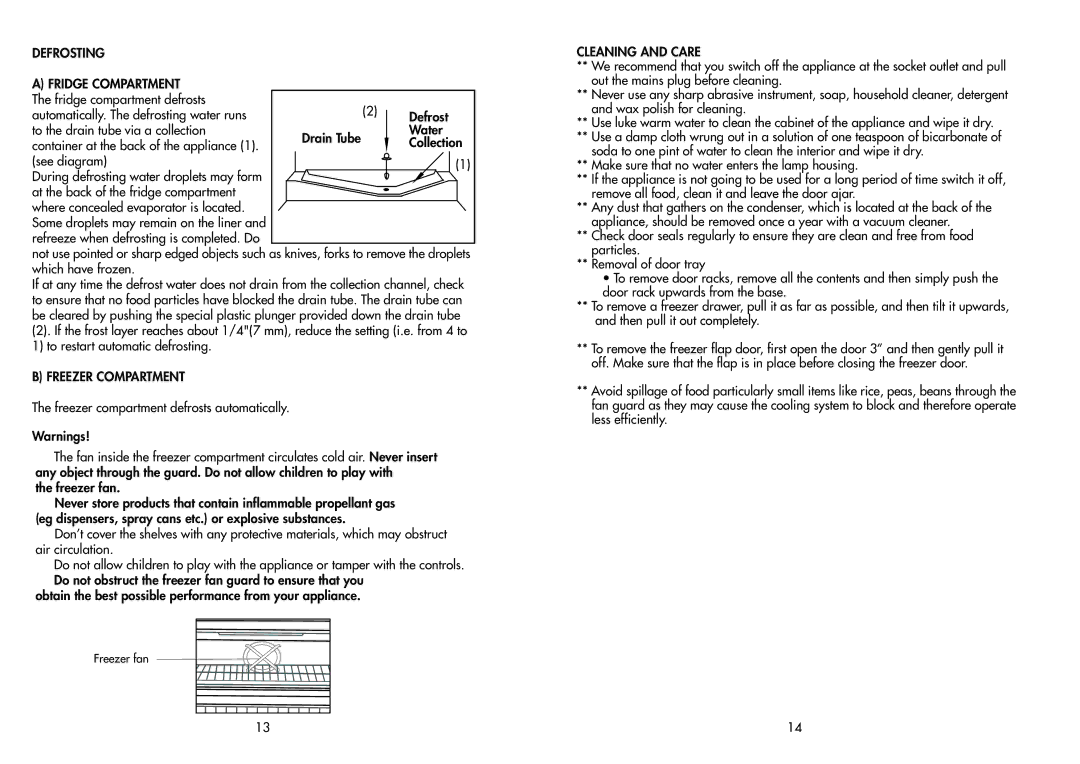
DEFROSTING |
|
|
|
|
|
|
|
|
|
|
|
|
|
|
A) FRIDGE COMPARTMENT |
|
|
|
|
|
|
|
|
|
|
|
|
|
|
The fridge compartment defrosts | (2) |
|
|
|
|
|
|
|
|
| ||||
automatically. The defrosting water runs |
|
|
|
| Defrost | |||||||||
|
|
|
| |||||||||||
to the drain tube via a collection |
|
| Drain Tube |
|
|
|
| Water | ||||||
container at the back of the appliance (1). |
|
|
|
|
|
| Collection | |||||||
|
|
|
|
|
|
|
|
| ||||||
(see diagram) |
|
|
|
|
|
|
|
|
|
|
|
| (1) | |
|
|
|
|
|
|
|
|
|
|
|
| |||
During defrosting water droplets may form |
|
|
|
|
|
|
|
|
|
|
|
|
|
|
|
|
|
|
|
|
|
|
|
|
|
|
|
| |
|
|
|
|
|
|
|
|
|
|
|
|
|
| |
at the back of the fridge compartment |
|
|
|
|
|
|
|
|
|
|
|
|
|
|
|
|
|
|
|
|
|
|
|
|
|
|
|
| |
|
|
|
|
|
|
|
|
|
|
|
|
|
| |
where concealed evaporator is located. |
|
|
|
|
|
|
|
|
|
|
|
|
|
|
|
|
|
|
|
|
|
|
|
|
|
|
|
| |
Some droplets may remain on the liner and |
|
|
|
|
|
|
|
|
|
|
|
|
|
|
refreeze when defrosting is completed. Do |
|
|
|
|
|
|
|
|
|
|
|
|
|
|
not use pointed or sharp edged objects such as knives, forks to remove the droplets which have frozen.
If at any time the defrost water does not drain from the collection channel, check to ensure that no food particles have blocked the drain tube. The drain tube can be cleared by pushing the special plastic plunger provided down the drain tube
(2). If the frost layer reaches about 1/4"(7 mm), reduce the setting (i.e. from 4 to 1) to restart automatic defrosting.
B) FREEZER COMPARTMENT
The freezer compartment defrosts automatically.
Warnings!
The fan inside the freezer compartment circulates cold air. Never insert any object through the guard. Do not allow children to play with
the freezer fan.
Never store products that contain inflammable propellant gas (eg dispensers, spray cans etc.) or explosive substances.
Don’t cover the shelves with any protective materials, which may obstruct air circulation.
Do not allow children to play with the appliance or tamper with the controls. Do not obstruct the freezer fan guard to ensure that you
obtain the best possible performance from your appliance.
Freezer fan
13
CLEANING AND CARE
**We recommend that you switch off the appliance at the socket outlet and pull out the mains plug before cleaning.
**Never use any sharp abrasive instrument, soap, household cleaner, detergent and wax polish for cleaning.
**Use luke warm water to clean the cabinet of the appliance and wipe it dry.
**Use a damp cloth wrung out in a solution of one teaspoon of bicarbonate of soda to one pint of water to clean the interior and wipe it dry.
**Make sure that no water enters the lamp housing.
**If the appliance is not going to be used for a long period of time switch it off, remove all food, clean it and leave the door ajar.
**Any dust that gathers on the condenser, which is located at the back of the appliance, should be removed once a year with a vacuum cleaner.
**Check door seals regularly to ensure they are clean and free from food particles.
**Removal of door tray
•To remove door racks, remove all the contents and then simply push the door rack upwards from the base.
**To remove a freezer drawer, pull it as far as possible, and then tilt it upwards, and then pull it out completely.
**To remove the freezer flap door, first open the door 3” and then gently pull it off. Make sure that the flap is in place before closing the freezer door.
**Avoid spillage of food particularly small items like rice, peas, beans through the fan guard as they may cause the cooling system to block and therefore operate less efficiently.
14
